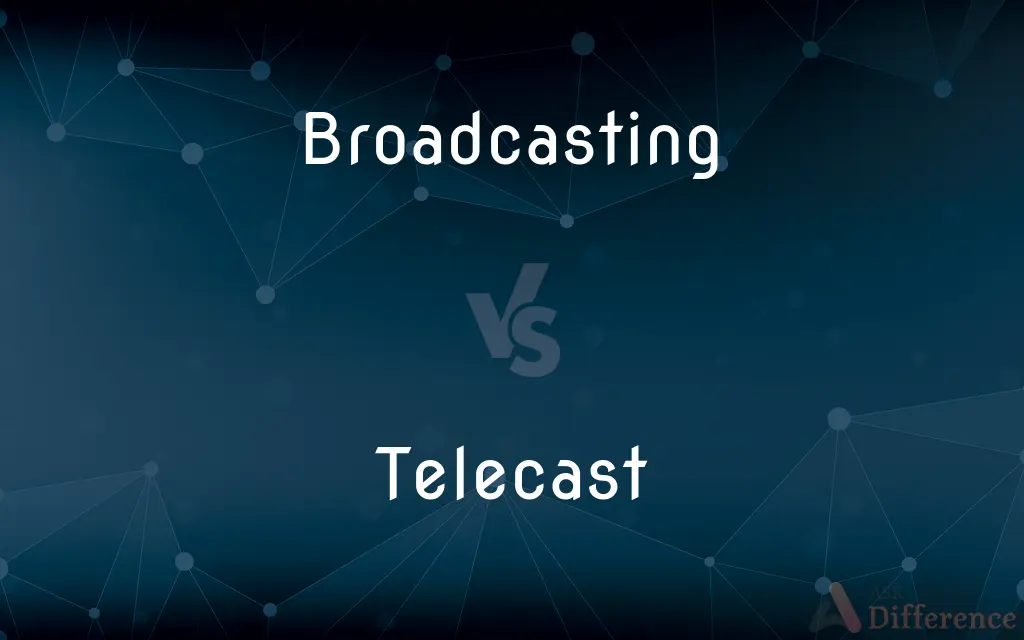Broadcasting vs. Telecast — What's the Difference?
Edited by Tayyaba Rehman — By Maham Liaqat — Updated on March 20, 2024
Broadcasting is the transmission of audio or video content to a wide audience, while telecasting specifically refers to television broadcasting.

Difference Between Broadcasting and Telecast
Table of Contents
ADVERTISEMENT
Key Differences
Broadcasting and telecasting are terms often used in the media and communications industry, both pertaining to the distribution of content to the public. Broadcasting is a broad term that encompasses the transmission of information, either audio or video, to a wide audience via any electronic mass communication medium. This includes radio, television, and even digital platforms. Telecasting, on the other hand, is a more specific term that refers exclusively to the transmission of content over television networks. It is essentially a subset of broadcasting focused solely on television content.
While broadcasting can occur over various mediums including radio, television, and the internet, telecasting is limited to television. This distinction highlights the medium-specific nature of telecasting as opposed to the broader reach and platform diversity of broadcasting. Broadcasting serves as an umbrella term under which telecasting falls, with the latter term often used to emphasize the television aspect of content dissemination.
In terms of content, broadcasting can range from audio-only formats, like radio shows and podcasts, to video formats, including live streaming on digital platforms. Telecasting, however, is primarily concerned with video content designed for television viewing. This can include news programs, live sports events, movies, and television series. The content tailored for telecasting is often produced with television broadcast standards and audience expectations in mind.
Technologically, broadcasting has evolved significantly from its early days, incorporating digital technologies and the internet to reach audiences across the globe. Telecasting too has seen advancements, with the transition from analog to digital broadcasting improving picture and sound quality. However, telecasting remains tied to the television as its primary medium, while broadcasting spans a wider array of technologies and platforms.
The regulatory frameworks for broadcasting and telecasting also highlight differences, especially considering the platform-specific regulations that apply to television broadcasts. Telecasting is subject to television broadcast standards and regulations that can include content rating systems, advertising limits, and broadcast licensing requirements. Broadcasting, in its broader sense, faces a more complex regulatory landscape that varies significantly across mediums and jurisdictions.
ADVERTISEMENT
Comparison Chart
Definition
Transmission of audio or video content to a wide audience via electronic means.
Transmission of video content specifically over television networks.
Mediums
Radio, television, internet.
Television only.
Content Type
Audio and video, including radio shows, podcasts, TV programs, and online streaming.
Primarily video content such as news, sports, movies, and TV shows.
Technological Scope
Includes a wide range of technologies from analog to digital and internet-based platforms.
Primarily involves television technology, including both analog and digital broadcasting.
Regulatory Framework
Varies widely across different mediums and includes internet content regulations.
Subject to television-specific broadcast standards and regulations.
Compare with Definitions
Broadcasting
Subject to a wide range of regulations.
The broadcasting company had to navigate complex FCC regulations.
Telecast
Exclusive to television content.
The telecast of the award show drew millions of viewers.
Broadcasting
Aims to reach a broad audience.
Broadcasting the event live ensured a global audience.
Telecast
Often live for events and sports.
The live telecast of the soccer game was highly anticipated.
Broadcasting
Can be live or pre-recorded.
They prepared a pre-recorded segment for broadcasting next week.
Telecast
Technologically focused on TV.
Advances in digital telecasting have improved picture quality.
Broadcasting
Includes digital and internet platforms.
Their broadcasting efforts expanded to include podcasts and live streaming.
Telecast
Tailored for a television viewing experience.
The series was specifically produced for telecast during prime time.
Broadcasting
Transmission of content over various media.
The radio station's broadcasting reaches millions of listeners daily.
Telecast
Subject to television broadcast standards.
The telecast complied with all broadcast standards and regulations.
Broadcasting
Broadcasting is the distribution of audio or video content to a dispersed audience via any electronic mass communications medium, but typically one using the electromagnetic spectrum (radio waves), in a one-to-many model. Broadcasting began with AM radio, which came into popular use around 1920 with the spread of vacuum tube radio transmitters and receivers.
Telecast
To broadcast a television program.
Broadcasting
To communicate or transmit (a signal, a message, or content, such as audio or video programming) to numerous recipients simultaneously over a communication network
A radio station that broadcasts news.
An agency broadcasting an appeal for donations over the internet.
Telecast
To broadcast (a program) by television.
Broadcasting
To make known over a wide area
Reporters who broadcast unchecked rumors in order to get the story out first.
"The birds sang in flight because that was the only way, in this treeless terrain, to broadcast their claims across their chosen pieces of land" (Kenn Kaufman).
Telecast
A television broadcast.
Broadcasting
To sow (seed) over a wide area, especially by hand.
Telecast
(transitive) To broadcast by television.
Broadcasting
To communicate or transmit a signal, a message, or content, such as audio or video programming, to numerous recipients simultaneously over a communication network.
Telecast
(intransitive) To broadcast a television program.
Broadcasting
The act or process of broadcasting a signal, a message, or content, such as audio or video programming.
Telecast
A television broadcast, especially outside of a studio.
Broadcasting
A signal, message, or audio or video program that is broadcast over a communication network
Watched the morning news broadcast.
Telecast
A television broadcast
Broadcasting
The act of scattering seed.
Telecast
Broadcast via television;
The Royal wedding was televised
Broadcasting
Communicated or transmitted by means of broadcasting, as over a communications network
A broadcast announcement.
Broadcasting
Of or relating to the broadcasting of audio or video content over communication networks, as in television or radio.
Broadcasting
Widely known.
Broadcasting
Scattered over a wide area.
Broadcasting
In a scattered manner.
Broadcasting
Sending in all directions.
Broadcasting
(business) The business or profession of radio and television.
Broadcasting can be a lucrative field, but very few people end up on the air.
Broadcasting
The act by which something is broadcast.
Frequent broadcastings of the same old material
Broadcasting
Present participle of broadcast
This radio station is broadcasting at a frequency of 104
We sowed the seeds, broadcasting with a rotary spreader.
Broadcasting
The medium that disseminates via telecommunications; radio and television.
Broadcasting
Taking part in a radio or tv program.
Broadcasting
A medium that disseminates via telecommunications
Broadcasting
Taking part in a radio or tv program
Common Curiosities
Is internet streaming considered broadcasting or telecasting?
Internet streaming is considered part of broadcasting, as it encompasses a wide range of content transmission, not limited to television.
What does telecasting mean?
Telecasting refers specifically to the transmission of video content over television networks.
How do broadcasting and telecasting differ in medium?
Broadcasting can occur across multiple mediums like radio, TV, and online platforms, whereas telecasting is exclusive to television.
What is broadcasting?
Broadcasting is the transmission of audio or video content to a broad audience via various electronic means, including radio, TV, and the internet.
Do broadcasting and telecasting require different technologies?
Yes, while there is overlap, telecasting specifically requires television broadcasting technology, whereas broadcasting encompasses a wider range of technologies.
How has digital technology affected broadcasting and telecasting?
Digital technology has improved quality, expanded reach, and added interactive features to both broadcasting and telecasting.
What role does content play in differentiating broadcasting from telecasting?
Content type and preparation are tailored to the specific medium, with broadcasting covering a broader range of content than telecasting, which is focused on TV-specific content.
Can telecasting include radio broadcasts?
No, telecasting is specifically related to television content and does not include radio broadcasts.
Are the regulations the same for broadcasting and telecasting?
No, regulations vary, with telecasting facing specific television broadcast standards and broadcasting covering a broader regulatory spectrum.
Which has a wider reach, broadcasting or telecasting?
Broadcasting has a wider reach as it includes telecasting among other forms of media transmission.
How do audience expectations differ between broadcasting and telecasting?
Audience expectations can vary based on the medium, with telecasting audiences perhaps expecting more visually engaging content suited for television viewing.
How do advancements in technology impact broadcasting differently than telecasting?
Technological advancements expand broadcasting's reach and format diversity more significantly than telecasting, which remains focused on television technology.
What is the significance of live telecasts in today's digital age?
Live telecasts hold significant value for real-time engagement and delivering large-scale events directly to television audiences, maintaining relevance despite the rise of digital platforms.
What are some challenges unique to telecasting?
Telecasting faces unique challenges such as adhering to specific broadcast times, competing with digital platforms, and meeting television broadcast standards.
Can a telecast be considered a broadcast?
Yes, a telecast is a type of broadcast specifically tailored for television.
Share Your Discovery

Previous Comparison
Decibel vs. Hertz
Next Comparison
Interview vs. SurveyAuthor Spotlight
Written by
Maham LiaqatEdited by
Tayyaba RehmanTayyaba Rehman is a distinguished writer, currently serving as a primary contributor to askdifference.com. As a researcher in semantics and etymology, Tayyaba's passion for the complexity of languages and their distinctions has found a perfect home on the platform. Tayyaba delves into the intricacies of language, distinguishing between commonly confused words and phrases, thereby providing clarity for readers worldwide.















































